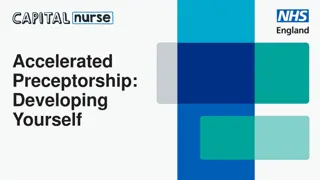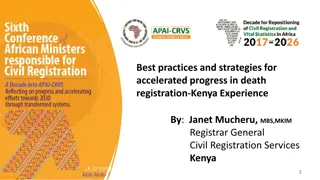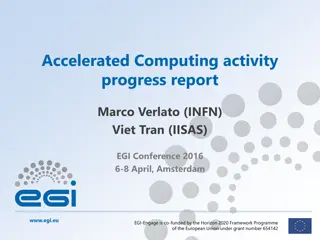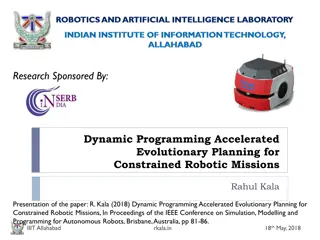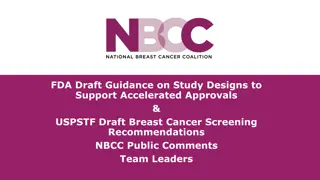
Accelerated Preceptorship and Professional Development
Explore the essence of professionalism in healthcare, understand the values and challenges, and discover the multifaceted nature of professional development. Engage with session objectives to enhance your practice and collaboration skills.
Download Presentation

Please find below an Image/Link to download the presentation.
The content on the website is provided AS IS for your information and personal use only. It may not be sold, licensed, or shared on other websites without obtaining consent from the author. If you encounter any issues during the download, it is possible that the publisher has removed the file from their server.
You are allowed to download the files provided on this website for personal or commercial use, subject to the condition that they are used lawfully. All files are the property of their respective owners.
The content on the website is provided AS IS for your information and personal use only. It may not be sold, licensed, or shared on other websites without obtaining consent from the author.
E N D
Presentation Transcript
Accelerated Preceptorship: My Professional Practice For Newly Qualified Practitioners and Healthcare Professionals on Temporary Register CapitalNurse is jointly sponsored by Health Education England, NHS England and NHS Improvement
Session Objectives By the end of this session you will: Understand your professional code of conduct and the application to your role in the workplace Appreciate the professional standards of accountability, delegation and scope of practice Be aware of the implications of social media Appreciate the value of collaborative practice
What is professionalism? We all know professionalism when we see it but it can be difficult to describe Consider what you mean by professionalism. Write down 6 words related to what it means to you What are situations that challenge your professionalism?
Values Personal Interpersonal Organisational / Institutional /Cultural Appropriate Behaviour Attitude Capabilities Good clinical practice Maintaining knowledge and skills Image inspire trust and confidence Appearance Punctuality Part of identity Responsible Reliable Honest Accountable Flexible communication Treat people equally Role model Adapt to situation and context Courteous, civil, polite Treat with dignity & respect Codes regulations protocols Influences of: Healthcare system Organisation Profession Political and economic agendas Time pressures Hierarchical Structures Cultural, social and moral influences of society
Professionalism There are 3 ways of talking about professionalism. Individual Interpersonal Organisational / Institutional / Cultural Individual The three overlap forming a complex picture of professionalism that is both individual but constrained or enabled by context. Organisational /Institutional/ Cultural Interpersonal
Professional development Professionalism develops in different ways . Which factors have influenced your professional development and how? Media Previous employment Hospital, Call the midwife, Ambulance As a care assistant and a playscheme leader. Work based learning Role model Worked as part of MDT First clinical supervisor influenced professional identity Education and Training Developed professional communication skills Organisational environment Demonstrates a culture of respect and openness throughout. Personal Background Mother is a highly organised teacher
Professionalism Develops in different ways (see above) Professional and regulatory bodies support maintenance of professionalism.
Codes of Conduct Each profession has a regulatory body: For AHPs Health and Care Professional Council (HCPC) https://www.hcpc-uk.org/ For Nurses and Midwives the Nursing and Midwifery Council (NMC) https://www.nmc.org.uk/ The relevant regulatory body provides governance, standards and support It is important for you to review and understand your professional standards of practice: https://www.hcpc-uk.org/standards/ https://www.nmc.org.uk/standards/code/
Professionalism Here we focus on Accountability Delegation Values Scope of Practice Communication Teamwork
Organisational Values Each organisation will have its own organisational values that will underpin your clinical practice Find out what your organisational values are Write an example for each of how you plan to build them into your clinical work
Individual Values We each have personal values that we bring to our working life. What 3 values are important to you in your work life? Open Achievement Integrity Quality communication Time Work/life balance Accountability Hard work management Acceptance Growth Respect Honesty
Professional Values Values that are integral to The Code and Standards of Conduct Performance and Ethics Open Accountability Integrity communication Trustworthy Fairness Candour Honesty
Accountability Accountable to ? As a HCP, I am professionally accountable to .NMC/HCPC As a HCP, I am contractually accountable to Employing organisation As a HCP, I am legally accountable to The law
Accountability you are personally responsible for the way you behave. You will need to use your judgement so that you make informed and reasonable decisions that meet the standards. You must always be prepared to justify your decisions and actions. 1 Principle 1.1.5. Members are responsible and accountable for their decisions and actions, including when they delegate activity to others 2 You are not just accountable for your competence but also your actions and behaviours both internal to and external to the workplace . 3
Delegation Registering and professional bodies are explicit and clear around accountability and delegation 11. Be accountable for decisions to delegate tasks and duties to other people: 4 11.1 only delegate tasks and duties that are within the other person s scope of competence, making sure that they fully understand your instructions 11.2 make sure that everyone you delegate tasks to is adequately supervised and supported so they can provide safe and compassionate care 11.3 confirm that the outcome of any task you have delegated to someone else meets the required standard
Delegation During the response to COVID-19 you may be working in extremely challenging and possibly unfamiliar environments. Despite pressures it is still important that whenever you delegate work you do so safely and effectively. So only delegate work within that person s scope of practice and continue to provide supervision and support to them.
Delegation Consider the following scenarios and think about the challenges to delegation to an NA /TA/HCA? What might you consider and how can you address the issues safely? Walk to the bathroom - Mr A walks very quickly, does not respond to prompts to walk slowly - becomes agitated and has a tendency to lose his balance Taking observations - Miss L is recovering well post-surgery and is now back on the ward Feeding a patient - Mrs B has had a recent CVA she has just progressed to a highly modified diet and has particular supervision guidelines to prevent aspiration
Scope of Practice Keep within your scope of practice 1 3.1 you must keep within your scope of practice by only practising in areas you have appropriate knowledge, skills and experience for 3.2 you must refer the service user to another practitioner if the care, treatment or other services then need are beyond your scope of practice 3.3 you musts keep your knowledge and skills up to date and relevant to your scope of practice through continuing professional development Recognise and work within the limits of your competence 4 13.3 ask for help from a suitably qualified and experienced professional to carry out any action or procedure that is beyond the limits of your competence 13.5 complete the necessary training before carrying out a new role
Scope of Practice The unique challenges that COVID-19 presents means you may be working or be asked to work in new roles that may be outside your traditional scope of practice. Due to pressure on services you may be asked to perform these roles with limited training or supervision. There is helpful guidance in COVID Hubs of both the NMC and HCPC websites: Letter: Supporting Nurses, Midwives and Nursing Associates (England) in the event of a COVID-19 epidemic in the UK https://www.england.nhs.uk/coronavirus/wp- content/uploads/sites/52/2020/03/joint-nm-letter-12-march-2020.pdf HCPC Advice: Applying our Standards Scope of practice. (2020) https://www.hcpc-uk.org/covid-19/advice/applying-our-standards/scope-of- practice/
Scope of Practice In addition The Chief Executives of statutory regulators of health and care professionals issued a joint statement can be found . NMC Website https://www.nmc.org.uk/globalassets/sitedocuments/other- publications/conflicts-of-interest-joint-statement.pdf HCPC Website https://www.hcpc-uk.org/news-and-events/news/2019/hcpc-unites-with-health- regulators-to-issue-joint-statement-in-support-reflective-practice-across- healthcare/
Scope of Practice Consider a situation where you have been / might be asked to do something that is outside your current scope of practice e.g. administer medication, insert a cannula, suction a patient, assess a patient s swallow How did / would the situation make you feel and why? How did / might you respond?
Image: Inspire trust and confidence Uphold your own and your profession s reputation through your personal and professional conduct. Let us consider this in relation to social media . Consider who and what you associate with on social media Consider the possibility of other people mentioning you or posting pictures in inappropriate posts Consider what you have posted online in the past
NMC & HCPC Guidance Use all forms of spoken, written and digital communication (including social media and networking sites) responsibly. (The Code, paragraph 20.10) You must use all forms of communication appropriately and responsibly, including social media and networking websites. (Standards of conduct, performance and ethics, paragraph 2.7)
Benefits of Social Media If used appropriately and responsibly social networking sites can offer benefits to HCPs including: Build and maintain professional relationships Access professional networks with other HCPs globally Access resources for CPD Help the public understand what we do Raise the profile of HCPs
Social Media Guidance 10 Unlawful or unprofessional use of social media may jeopardise NMC/HCPC registration and includes: Posting pictures or information about patients Inappropriate sharing of confidential information Bullying or intimidating people Building relationships with patients and service users Stealing personal information or identity Inciting hatred or discrimination Encouraging violence or self-harm
Top Tips 11 To use social media in a way that meets standards: Think before you post assume it can be shared and read by anyone Think about who can see what you share remember privacy settings cannot guarantee that what you post cannot be publicly viewed Maintain appropriate professional boundaries with colleagues, service users and carers Do not post information that can identify the service user unless you have their permission Do not post inappropriate or offensive material Follow your employer s social media policy
Appropriate use of social media Be informed of different social media types, advantages and disadvantages Check your professional and employer social media guidance Maintain your professionalism Protect your reputation
Appropriate use of social media Consider the following scenarios and how The Code or Standards of Conduct Performance and Ethics apply: A patient who has been treated for Covid-19 is being discharged to staff clapping. The hospital Comms team are taking photographs a HCP takes a photograph with their phone and posts it on Facebook. A patient that was under your care requests to follow you on Instagram.
Collaborative Practice multiple health workers from different professional backgrounds working together with patients, families, carers, and communities to deliver the highest quality care 6 No profession alone can meet all the needs of those who use our services. However by using the skills and expertise of all members of the multidisciplinary team in an integrated way, we can ensure that all the needs of those people using our services are met. The benefits of inter-professional collaborative practice include improved patient care and outcomes, fewer preventable errors, reduced healthcare costs and improved staff satisfaction.
Teamwork The collaborative worker: 7. Analyses the process of team (group) development Establishes and maintains effective working relationships with other team members and other teams Effectively facilitates discussions and interactions among team members Engages in shared decision making to establish and achieve commonly agreed goals Respects all team members contribution to collaborative decision making Respects team ethics including confidentiality, resource and workload allocation, and professionalism
Teamwork Reviews of high-profile incidents have identified three main types of teamwork failings - unclear definition of roles, lack of explicit coordination and miscommunication. Teamwork is most effective with: Shared goals - clearly defined with collective interests and shared ownership Clear roles - understanding of each member s function, responsibility and accountability optimises efficiency Mutual trust and respect - for each others roles, skills, beliefs and professional contribution. Accept and encourage diversity of opinion Effective communication -Prioritises and continuously refines communication skills Measurable processes and outcomes reliable and timely feedback on successes and failures Leadership that motivates facilitates, coaches and co-ordinates activities.
Teamwork Consider a MDT that you have worked within. What made it most effective? What could have been developed? How did you engage with the team as a collaborative practitioner?
References 1. Health and Care Professions Council (2016) Standards of Conduct, Performance and Ethics. https://www.hcpc-uk.org/standards/standards-of-conduct-performance-and-ethics/ 2. Chartered Society of Physiotherapy (2019) The Code of Members Professional Values and Behaviours https://www.csp.org.uk/system/files/csp_code_of_professional_values_behaviour_full.pdf 3. Royal College of Occupational Therapists.(2015) Code of Ethics and Professional Conduct https://www.rcot.co.uk/practice-resources/rcot-publications/downloads/rcot-standards-and-ethics 4. Midwifery Council. The Code: Professional standards of Practice and behaviour for nurses, midwives and nursing associates. Accessed on 05.05.2020 https://www.nmc.org.uk/globalassets/sitedocuments/nmc-publications/nmc-code.pdf 5. Health and Care Professions Council (2020) Applying our Standards https://www.hcpc-uk.org/covid-19/advice/applying-our-standards 6. World Health Organization. (2010). Framework for action on interprofessional education and collaborative practice. World Health Organization. https://apps.who.int/iris/handle/10665/70185 7. Brewer ML, Jones S. 2013.An interprofessional capability framework focusing on safe, high quality client-centred health services. J Allied Health. 42:45 49E ,
References 8. Blog Olivia Bird (2019) Can I do that? Thinking through your scope of practice https://www.hcpc-uk.org/news-and-events/blog/2019/can-i-do-that-thinking-through-your-scope-of- practice/ 9. Letter: Supporting Nurses, Midwives and Nursing Associates (England) in the event of a COVID-19 epidemic in the UK https://www.england.nhs.uk/coronavirus/wp- content/uploads/sites/52/2020/03/joint-nm-letter-12-march-2020.pdf 10.Nursing and Midwifery Council . Guidance on using social media responsibly https://www.nmc.org.uk/globalassets/sitedocuments/nmc-publications/social-media-guidance.pdf 11. Health and Care Professions Council (2018) Guidance on the use of social media https://www.hcpc-uk.org/registration/meeting-our-standards/guidance-on-use-of-social-media/ 12. Chief nursing officers for the UK and Nursing an Midwifery Council (2017) Enabling Professionalism in Nursing an Midwifery https://www.nmc.org.uk/globalassets/sitedocuments/other-publications/enabling-professionalism.pdf
Acknowledgments Catherine DesForges, Head of Education and Development for AHPs, Royal Free London NHS Trust Desiree Cox, Preceptorship Project Manager, CapitalNurse Jules Marchant, Therapy Practice Development Lead, Guy s and St Thomas NHS Trust, and Health Education England RePAIR Fellow

